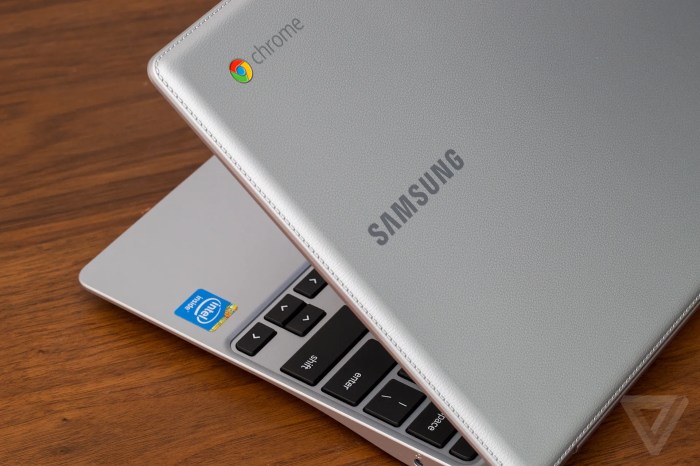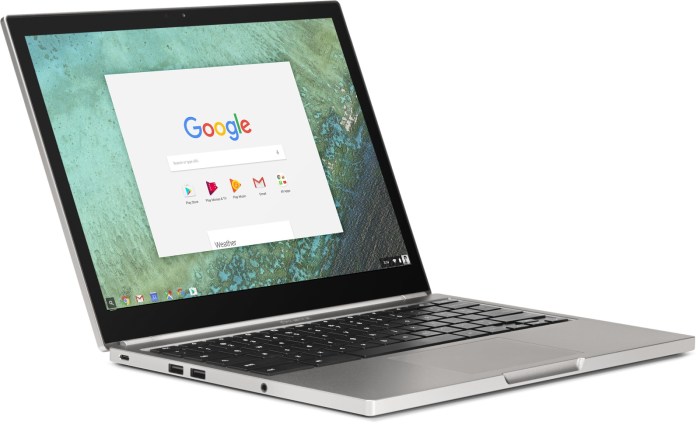Macs outsold by Chromebooks for the first time? It’s a headline that’s sure to make tech enthusiasts raise an eyebrow. The once-unthinkable has happened, and the implications are far-reaching. While Macs have long held a reputation for sleek design and user-friendly interfaces, Chromebooks have quietly been gaining ground, particularly in the education and budget-conscious markets. What’s driving this shift? Is it the affordability of Chromebooks, their seamless integration with Google services, or perhaps a growing preference for cloud-based computing?
The answer, as with most things in the tech world, is complex. This isn’t just about two products battling for market share. It’s a reflection of changing user needs and preferences, the evolving landscape of computing, and the rise of a new generation of digital natives who are more comfortable navigating the cloud than traditional desktop operating systems.
The recent news that Chromebooks outsold Macs for the first time marks a significant shift in the personal computing landscape. This development is not a sudden occurrence but rather a culmination of several factors that have been reshaping the market for years.
For a long time, Apple’s Macs held a dominant position in the premium computing segment. They were known for their sleek design, user-friendly operating system, and strong ecosystem. However, the market share of Macs has been steadily declining in recent years, while Chromebooks have been gaining traction.
Several factors have contributed to this shift in market share, including:
Price
Chromebooks are generally significantly cheaper than Macs. This price difference is particularly attractive to budget-conscious consumers, students, and educators.
Features
Chromebooks offer a streamlined user experience, primarily focused on web browsing and cloud-based applications. This simplicity makes them ideal for tasks such as email, document editing, and web browsing. They are also lightweight and portable, making them suitable for students and professionals on the go.
Target Audience
Chromebooks have successfully targeted specific demographics, particularly students and educators. They are often included in educational programs due to their affordability and ease of management.
Mac Sales Decline
Apple’s Mac sales have been declining in recent years, driven by factors such as the increasing popularity of Chromebooks, the rise of mobile devices, and the lack of significant innovation in the Mac lineup.
“The Chromebook market is booming, and it’s eating into Apple’s market share.” – Analyst, Gartner
Apple’s Response: Macs Outsold By Chromebooks For The First Time
While Apple hasn’t publicly acknowledged being outsold by Chromebooks, the company has been making moves to address the growing competition. Apple has long been known for its premium pricing strategy, but in recent years, they’ve been facing pressure to become more competitive on price.
Price Adjustments
Apple has been making adjustments to its pricing strategy, particularly in the education market. In 2020, Apple introduced a new educational discount program that offered significant price reductions on Macs for students and educators. This move was seen as a direct response to the growing popularity of Chromebooks in schools.
Product Updates
Apple has also been updating its Mac lineup with new features and improved performance. In 2020, Apple introduced the new Apple Silicon M1 chip, which significantly improved the performance of Macs while reducing their power consumption. Apple has also been working to improve the integration of its ecosystem, including iCloud, Apple Music, and Apple TV+, making it more appealing to users who rely on these services.
Marketing Strategies, Macs outsold by chromebooks for the first time
Apple has been trying to differentiate its Macs from Chromebooks by emphasizing the premium features and user experience offered by its products. The company has been running marketing campaigns that highlight the creative capabilities of Macs, as well as the security and privacy features built into macOS. Apple has also been focusing on the benefits of its ecosystem, emphasizing the seamless integration of Macs with other Apple devices, such as iPhones, iPads, and Apple Watches.
Future Outlook
The news that Chromebooks outsold Macs for the first time has sent ripples through the tech industry, sparking questions about the future of both Apple and Google in the personal computing landscape. This market shift signifies a changing tide in consumer preferences, with Chromebook’s affordability and ease of use proving increasingly appealing.
Potential Implications for Apple and Google
This shift in market share presents both opportunities and challenges for both companies. For Apple, the decline in Mac sales could indicate a need to adapt its pricing strategy or offer more competitive features. They might also consider expanding their offerings in the education sector, where Chromebooks currently dominate. Google, on the other hand, can leverage this momentum to further solidify its position in the education market and explore new avenues for Chromebook adoption in the enterprise sector.
Comparing Macs and Chromebooks
The following table highlights the key features of Macs and Chromebooks, emphasizing their strengths and weaknesses:
| Feature | Macs | Chromebooks |
|—|—|—|
| Operating System | macOS | Chrome OS |
| Hardware | Powerful, high-quality hardware | Less powerful, but often more affordable |
| Software | Wide range of software, including professional apps | Limited software selection, primarily web-based apps |
| Security | Strong security features | Relatively secure, but less robust than macOS |
| Price | Typically more expensive | Generally more affordable |
| User Experience | Intuitive and user-friendly | Simple and easy to use |
| Customization | High degree of customization | Limited customization options |
A visual representation of the market share trends for Macs and Chromebooks over the past five years would illustrate the gradual rise of Chromebooks and the corresponding decline in Mac sales.
* 2018: Macs held a dominant market share, with Chromebooks accounting for a smaller percentage.
* 2019: Chromebooks began to gain ground, with their market share increasing significantly.
* 2020: The pandemic fueled the growth of Chromebooks, as remote learning and work became the norm.
* 2021: Chromebooks continued to gain momentum, further narrowing the gap with Macs.
* 2022: Chromebooks surpassed Macs in market share for the first time, marking a significant shift in the personal computing landscape.
This trend suggests that Chromebooks are becoming increasingly popular, particularly among budget-conscious consumers and students. As Chromebook manufacturers continue to innovate and improve their offerings, it’s likely that their market share will continue to grow in the coming years.
User Perspectives
The shift from Macs to Chromebooks is not just a statistical trend; it’s a reflection of evolving user needs and preferences. While Macs have long been associated with creativity and productivity, Chromebooks offer a compelling alternative for many users, particularly those seeking simplicity, affordability, and seamless integration with cloud services.
User Experiences
The decision to switch from a Mac to a Chromebook is often driven by a combination of factors. Here are some examples of user experiences that highlight the reasons behind this shift:
“I used to be a die-hard Mac user, but after trying a Chromebook, I realized I didn’t need the power or complexity of a Mac for my everyday tasks. I mainly use my laptop for browsing, email, and light document editing, and the Chromebook handles these tasks flawlessly. Plus, the battery life is amazing!” – Sarah, a freelance writer.
“I switched to a Chromebook for my kids because it’s much more affordable than a Mac. They primarily use it for schoolwork and entertainment, and the Chromebook is perfect for that. It’s also much more secure than a traditional laptop, which is important for kids who might not be as tech-savvy.” – David, a father of two.
Key Considerations for Users
When choosing between a Mac and a Chromebook, users weigh several factors:
| Factor | Mac | Chromebook |
|---|---|---|
| Price | Higher | Lower |
| Operating System | macOS, a proprietary operating system | Chrome OS, a web-based operating system |
| Performance | High-performance hardware, capable of demanding tasks | Limited to web-based applications, but optimized for speed and efficiency |
| Software Compatibility | Access to a wide range of software, including professional apps | Limited to web-based applications and Android apps |
| Security | High security standards, but vulnerable to malware | Built-in security features, including automatic updates and sandboxing |
| Portability | Lightweight and portable, but can be expensive | Lightweight and affordable, but may lack features |
Types of Users Likely to Choose Chromebooks
Chromebooks appeal to a specific segment of users, including:
- Students: Chromebooks are budget-friendly and offer a secure platform for educational tasks.
- Casual Users: Individuals who primarily use their laptops for web browsing, email, and basic productivity tasks find Chromebooks efficient and easy to use.
- Cloud-centric Users: Those who rely heavily on cloud services for storage and applications find Chromebooks seamlessly integrated with their workflow.
- Budget-conscious Consumers: Chromebooks offer a cost-effective alternative to Macs, especially for users who don’t require the full range of features offered by a Mac.
The Chromebook’s victory isn’t just a win for Google. It’s a sign that the computing landscape is evolving, and users are increasingly seeking devices that are affordable, accessible, and connected. Whether Macs can reclaim their throne or if Chromebooks are poised to dominate the future remains to be seen. One thing’s for sure: the battle for the future of computing is far from over.
It’s official: Chromebooks have officially dethroned Macs, marking a significant shift in the tech landscape. While the Mac faithful might be feeling a bit salty, the news comes just in time for the launch of the highly anticipated Huawei Honor 7 , which is rumored to be a game-changer in the budget smartphone market. Whether this new release will tempt those looking for a more affordable alternative to the Mac remains to be seen, but one thing’s for sure: the tech world is in for an exciting ride.
 Standi Techno News
Standi Techno News

